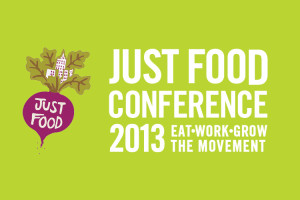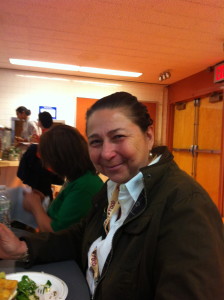Writers on Writing
March 25, 2013Postcards from Vegas
May 3, 2013It’s Not Just About Food
A decade ago, shortly after I started working at Gourmet (RIP), I attended a food-writing panel that included one of our senior editors. The moderator introduced my colleague as someone whose beat was “food politics,” and even though the audience was stocked with culinarily obsessed people, it became apparent during the Q&A that many folks had no idea what the term “food politics” meant.
Well, times have certainly changed. These days, you’d be hard pressed to find “foodies” (a word I dislike, but a convenient shorthand, nonetheless) who aren’t at least cursorily familiar with some of the thorny issues surrounding the harvesting, production, marketing, and consumption of food and drink. Nowhere has this fact been made more apparent to me than at a recent conference right here in the Big Apple.
Organized by Just Food—a NYC-based nonprofit that works to make fresh, locally grown food more accessible via community gardens, CSAs, farmers markets, and the like—the two-day conference covered nearly every conceivable facet of the subject, ranging from weighty discussions on community-supported fisheries, hunger and food policy, and the effects of fracking on farmland, as well as lighter, more practical sessions on fermentation, how to grow micro-greens, and the basics of milk chemistry and cheesemaking (the latter featuring what I consider the best title of the conference: “Curd Nerds”).

Byron Hurt, a filmmaker whose documentary Soul Food Junkies looks at the social history and health implications of soul food
The gathering provided a wealth of information, which I hope to convert into story pitches (and, eventually, with any luck, published articles), but it also offered something more intangible and profound: inspiration. I find it all too easy to feel defeated when I read about, for example, the uphill battle for GMO labeling in the US, or the proliferation of so-called “Ag-gag” bills, which make it illegal to engage in covert videotaping of abuses at livestock operations. (Incidentally, is there any other successful way to videotape abuses if not covertly? “Sir, would you please be so kind as to smile menacingly in this direction the next time you kick that chicken like a football? I didn’t quite get the proper angle with my pen camera the first time around.”)
For those of us who care about the quality of the food we consume—and the quality of life of those who cultivate, harvest, and serve it, as well as the animals who give up their lives to feed us—it is a daunting struggle we face. Despite the media clichés, it is NOT a bourgeois battle over the privilege of spending top dollar on pricey ingredients. What hangs in the balance is much, much bigger than the important choices we make every day. It’s a fight for community independence, social justice, environmental and personal health, economic autonomy, local control of our land and waters, transparency, and a host of other values that so many of us—I’d even wager it’s a majority—hold dear, if only the argument were framed in these terms instead of as an either-or choice between Taco Bell and a $8 biodynamically raised avocado.
The take-home message of this conference is that all hope is not lost. While it’s true that those who are putting up roadblocks are the very definition of Goliath (read: rich multinationals armed to the teeth with all of the weapons that their squadrons of lawyers and lobbyists can wield), it’s also true that the sustainable food movement (or whatever you want to call it) has more troops now than ever before, as became evident to me by simply looking around the room. Over the two days, 2,000 people attended the Just Food event, a remarkable number for a gathering organized by what is essentially a locally based organization with an ultra-focused mission.
And while we’re knocking down some straw men, don’t believe those who blather on about how this movement is populated only by upper-middle-class white folks in Birkenstocks. It’s a tired ‘ol trope that needs to lie down and give up its ghost. Every session brought me face to face with committed and passionate individuals of all races, from all walks of life. Yes, there were some people in earth-toned shoes with excellent arch support, but we also heard from a Bronx-based African-American woman who is a long-time urban farmer and activist. A twenty-something Latino-American man who received the conference’s flagship award for his work with community gardens. An Asian-American woman who’s fighting to defend the rights of New York City’s restaurant workers. And a devout Muslim man whose family has an organic farm in upstate New York and who shared with the audience how his faith instructs him to serve God by serving mankind—which for him means, “I’m not going to spray toxic chemicals on the food I grow and then turn around and sell it to you.” Like the healthy gardens, farms, and communities that these folks work so hard to cultivate, the movement itself boasts (and benefits from) an incredible diversity. To proclaim otherwise is not only a lie, but also a slap in the face of those who manage to achieve so much for so little in return.
The stories and lessons learned are too many in number to shoehorn into just one blog post, so please check back here in the future for additional information. And in the interim, I encourage you to get involved in any way that you can. Understand your choices. Know what you are buying. Advocate for the kind of food (and society) you want. And if you’re able, please think about volunteering for Just Food or any of the other terrific groups like it that are working hard to making a difference in your community.



